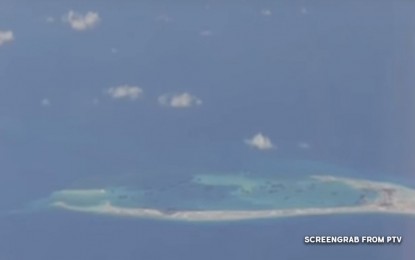From the Philippine News Agency (Aug 24, 2021): PH, Australia against 'coercive' use of coast guard ships in SCS (By Joyce Ann L. Rocamora)

The Philippines and Australia have expressed "serious concern" over what they described as "dangerous and coercive" use of coast guard vessels and maritime militias in the disputed South China Sea.
The statement came during the Joint Ministerial Meeting between Foreign Affairs Secretary Teodoro Locsin Jr. and Australian Foreign Minister Marise Payne who were joined by Australian Trade Minister Dan Tehan and his Philippine counterpart Secretary Ramon Lopez on August 23.
"The Ministers and Secretaries expressed serious concern about the continuing militarization of disputed features in the South China Sea, the dangerous and coercive use of coast guard vessels and maritime militias, and efforts to disrupt other countries’ resource exploitation activities," a joint statement posted by Payne on Tuesday read.
"They emphasized that the actions of a state’s coast guard, and its associated legal frameworks, must be consistent with international law," it added.
The two nations then reiterated the importance of freedom of navigation and overflight as Australia joined Manila in reaffirming the 2016 South China Sea Arbitration Award as "final and legally binding" on the parties to the dispute.
Last February, the Philippines has "strongly opposed" any application of China's Coast Guard (CCG) Law beyond Beijing's maritime entitlements stated under the international law and the 2016 arbitral ruling. The said law allows the CCG to fire on foreign vessels it deemed infringing on its sovereignty or jurisdiction.
The South China Sea where the Spratlys Islands are located is contested by the Philippines, Vietnam, Malaysia, Brunei, Taiwan, and China, which claims almost 80 percent of the waters under its so-called "nine-dash line".
At present, China and the Association of Southeast Asian Nations are working on a Code of Conduct that would serve as a regional framework that establishes rules and standards in the disputed waters.
Canberra and Manila both hoped that the document would be "fully consistent" with international law.
"They called for any Code of Conduct in the South China Sea to be fully consistent with international law, in particular UNCLOS (United National Convention on the Law of the Sea), not prejudice the interests of third parties or the rights of states under international law, and support existing inclusive regional architecture," the statement read.
Aside from shared aspiration for a "peaceful, stable, and secure" maritime domain, the two nations also vowed to continue activities on counter-terrorism, intelligence-sharing, border security, and law enforcement.
The officials likewise agreed to work closely to implement Canberra and Manila's commitments to uphold human rights through dialogue.
Particular reference was made to the 45th session of the Human Rights Council in October 2020 where Australia co-sponsored an Icelandic and Philippine joint resolution seeking technical assistance and capacity building for the promotion and protection of human rights in the Philippines.
The Philippines also conveyed that the UN Joint Program on Human Rights (UNJP) had been finalized and launched in July 2021. The initiative is aimed at enhancing the capacity of national institutions and actors and strengthening the country's compliance with its international human rights obligations.
https://www.pna.gov.ph/articles/1151510

No comments:
Post a Comment
Note: Only a member of this blog may post a comment.